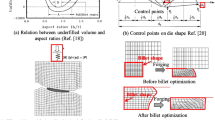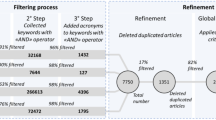Abstract
The technological and financial limitations in the manufacturing process are the reason for non-achievability of nominal dimension. Therefore, tolerance allocation is of significant importance for assembly. Conventional tolerance allocation methods are limited by an assumption that all parts are rigid. Every mechanical assembly consists of at least one or more flexible parts which undergo significant deformation due to inertia effect. Finite element analysis is used to determine the deformation of components in an assembly. Therefore, integration of statistical tolerance design with finite element analysis will guarantee that the optimal tolerance values of various components of the assembly obtained as end product of the tolerance design will remain within tolerance variation. Then the product can function as intended under a wide range of operating conditions for the duration of its life. In this paper, tolerance design of a piston cylinder assembly is done to demonstrate the proposed methodology.
Similar content being viewed by others
Reference
Y. M. Huang and C. S. Shiau, Optimal tolerance allocation for a sliding vane compressor, J Mech Des, 128 (2006) 98–107.
J. Deng and S. Deng, The adaptive branch and bound method of tolerance synthesis based on the reliability index, Int J Adv Manuf Tech, 20 (2002) 190–200.
M. F. Huang, Y. R. Zhong and Z. G. Xu, Concurrent process tolerance design on minimum product manufacturing cost and quality loss, Int J Adv Manuf Tech, 25 (2005) 174–722.
P. Wang and M. Liang, An integrated approach to tolerance synthesis, process selection and machining parameter optimization problems, Int J Prod Res, 43(11) (2005) 2237–2262.
S. S. Rao and W. Wu, Optimum tolerance allocation in mechanical assemblies using an interval method, Eng Optim, 37(3) (2005) 237–257.
C. Kao, C. C. Li and S. P. Chen, Tolerance allocation via simulation embedded sequential quadratic programming, Int J Prod Res, 38(17) (2000) 4345–4355.
C. Christopher, V. N. Yang and A. Naikan, Optimum tolerance design for complex assemblies using hierarchical interval constraint networks, Comput Ind Eng, 45 (2003) 511–543.
W. Wu and S. S. Rao, Uncertainty analysis and allocation of joint tolerances in robot manipulators based on interval analysis, Reliab Eng Syst Saf, 92 (2007) 54–64.
K. Sivakumar, C. Balamurugan and S. Ramabalan, Evo lutionary sensitivity-based conceptual design and tolerance allocation for mechanical assemblies, Int J of Adv Manuf Tech, 48 (2010) 307–324.
S. Samper and M. Giordano, Taking into account elastic displacement in 3D tolerancing models and application, Journal of Material Processing Technology, 78 (1998) 156–162.
S. C. Liu and S. J. Hu, Variation simulation for deformable sheet metal using finite element methods, Transaction of the ASME, Journal of Manufacturing Science and Engineering, 119 (1997) 368–374.
A. Jeang and E. Lieu, Robust tolerance design by com puter experiment, Int J prod res, 37(9) (1999) 1949–1961.
A. Jeang and C. L. Chang, Concurrent optimisation of parameter and tolerance design via computer simulation and statistical method, Int J of Adv Manuf Tech, 19 (2002) 432–441.
A. Jeang, T. K. Cheng and C. L. Chang, A statistical di mension and tolerance design for mechanical assembly Under thermal impact, Int J Adv Manuf Technol, 20 (2002) 907–915.
I. A. Manarvi and N. P. Juster, Framework of an integrated tolerance synthesis model and using FE simulation as A virtual tool for tolerance allocation in assembly design, Journal of Material processing Technology, 150 (2004) 182–193.
X. Liao and G. G. Wang, Employing fractals and FEM for detailed variation analysis of non-rigid as semblies, Int J of Machine tools and manufacture, 45 (2005) 445–454.
L. Pierre, D. Teissandier and J.P. Nadeau, Integration of thermo mechanical strains into tolerancing analysis, Int. J. Interact. Des. Manuf., 3(4) (2009) 247–263.
J. Mao, Y. L. Cao, S. Q. Liu and J. X. Yang, Manufacturing environment-oriented robust tolerance optimization method, Int. J. Adv. Manuf. Technol., 41 (2009) 57–65.
Author information
Authors and Affiliations
Corresponding author
Additional information
Recommended by Editor Sung-Lim Ko
K. Sivakumar is currently a Professor and Head in the Department of Mechanical Engineering, Bannari Amman Institute of Technology, Sathyamangalam-638401, India. He received his B.E (Mechanical Engineering) from Government College of Engineering, Tirunelveli and M. Tech. (Quality Assurance) and Ph.D in Production Engineering from National Institute of Technology, Trichy and he has 17-years of research and teaching experience. He has published 60 papers in national and international conference and 18 international and 1 national journal papers and his field of interest is the tolerance Design and Quality Engineering. At present he guides eight Ph.D. research scholars.
G. Jayaprakash is currently an Associate Professor in Department of Mechanical Engineering, Saranathan College of Engineering, Tiruchirappalli, Tamil nadu, India. He received his B.E (Mechanical Engineering) from CRESCENT Engineering College and M.E (CAD) from SATHYABAMA Deemed University. He is currently doing Ph.D. work at Anna University-Chennai, Tamilnadu, India. He has published 20 papers in national and international conferences and 10 papers in international journals. His current research interest includes tolerance design, optimization and finite element analysis.
M. Thilak is currently an Assistant Professor in the Department of Mechanical Engineering, TRP Engineering College (SRMGroup), Tiruchirappalli, Tamilnadu, India. He received his B.E. in Mechanical Engineering from Mookambigai College of Engineering, Pudukottai, Tamilnadu, India and M.E (CAD/CAM) from J. J. College of Engineering & Technology, Tiruchirappalli, Tamilnadu, India. He is currently doing his Ph.D work at Anna University (Coimbatore), Tamilnadu, India. He has published 4 papers in international journal, one paper in national journal, 19 papers in international conferences and 6 papers in national conferences. He is currently doing research in the area of CAD/CAE.
Rights and permissions
About this article
Cite this article
Govindarajalu, J., Karuppan, S. & Manoharan, T. Tolerance design of mechanical assembly using NSGA II and finite element analysis. J Mech Sci Technol 26, 3261–3268 (2012). https://doi.org/10.1007/s12206-012-0811-y
Received:
Revised:
Accepted:
Published:
Issue Date:
DOI: https://doi.org/10.1007/s12206-012-0811-y




